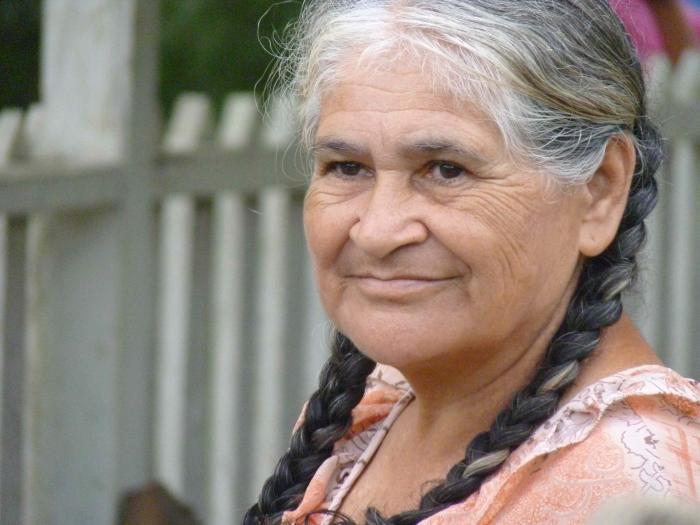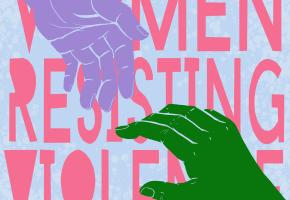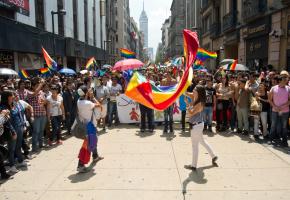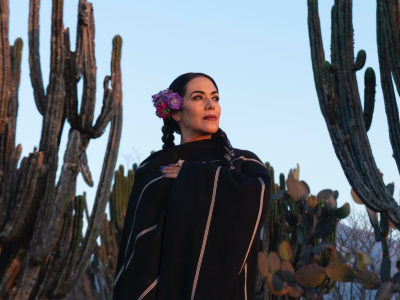
The Power of Refusal
Despite harassment and assassinations after declaring themselves neutral to Colombia’s armed conflict, The San José Peace Community, a group of brave rural farmers, have proved to be an inspiration for farming communities around the world. As they prepare to visit London in November to seek political and public support, Gwen Burnyeat, who spent time in the community as a member of Peace Brigades International, tells the story of this inspirational community and of their resistance to violence and commercial exploitation.
by Gwen Burnyeat
Image

If she were alive today, Brígida González’s daughter would be twenty-three, just four years younger than me. At that age, in rural Colombia, she would likely have started a young family, and would no doubt be following the example set by her mother of resisting injustice and war. But Elisenia was killed aged 15 in 2005 by the army, along with 5 other teenagers. The army tried to pass their bodies off as guerrillas killed in combat, a much-criticised practice known as “false positives.”
I first met Brígida in 2011, shortly after being deployed by Peace Brigades International (PBI) to the field team in the Urabá region of North-West Colombia. PBI is a Non-Governmental Organization (NGO) that provides protective accompaniment to human rights defenders, who are threatened because of the work they do. This international presence, combined with advocacy, creates a deterrent against potential aggressors, as it signifies the concern of the international community, the knowledge that there will be a response for any abuses they carry out.
In the Urabá team, where I worked for two years, one of the groups of human rights defenders I accompanied was the Peace Community of San José de Apartadó, of which Brígida is a member. The Peace Community, members of whom will be visiting London in November seeking political and public support, is a collective of 500 rural farmers who declared themselves neutral to the armed conflict, after a wave of paramilitary and military violence, ostensibly to combat the FARC guerrilla group, forced them from their lands during the 1990s.
During those years, all over Urabá the 17th Brigade of the army, under ex General Rito Alejo del Río in collaboration with paramilitaries carried out massacres of farmers, , and told people to leave their land. A common threat was, “you’ll sell me your land, or your widow will”. In 2012, Rito Alejo was sentenced to 25 years by a Colombian court for indirect perpetration in the murder of Marino López, an afro-descendent farmer from the Cacarica river basin, whose head was cut off by paramilitaries, who then played football with it in front of his community, to terrorise them into leaving their land.
The region of Urabá is incredibly resource-rich, possessing oil, coal, minerals, water sources, and fertile land attractive to agro-businesses. Human rights violations here have gone hand in hand with unscrupulous plundering of stolen lands. In a 2005 interview, paramilitary chief Vicente Castaño admitted that he had actively recruited palm oil businesses to operate in stolen land. There is also a case against several banana and plantain companies for benefitting from human rights abuses and collaborating directly with paramilitary groups.
In this context, where conflict permeates every level of society, the declaration of neutrality in 1997 by the San José de Apartadó farmers was a candle lit in the dark. Marking their living spaces clearly as civilian population is similar to the idea of a red cross sign on a hospital, as they claim their right to non-involvement in the conflict and demand that armed actors do not enter their living areas. Their principle of neutrality has enabled them to return to many of their settlements, but has also come at great cost as their resistance in their territory is seen as a threat to those who want to exploit the land, and those who would prefer the human rights abuses to remain in impunity.
Despite harassment on a daily basis, the Peace Community has become the expression of an alternative life project. They run a farmers’ university which shares knowledge with other communities about political organisation and sustainable farming, and they export fair trade cocoa to Europe. This sends a message to foreign consumers, and means they get a better deal for their labour. This means sustainability of their project, which means protection. They are able to buy cocoa from local farmers who aren’t members of the Community, or pay them to work on Community-owned plantations, thus benefiting local economy and protecting the traditional way of life and working the land, which is their lifeline. “A farmer without land is like a child without a mother”, says Jesús Emilio Tuberquia, of the Internal Council of the Peace Community.
But the Peace Community is in constant danger. Since their foundation in 1997, over 200 local farmers have been assassinated. The fact that they denounce human rights abuses and fight against impunity, rather than keep silent, exposes them to reprisals. The accompaniment of PBI protects their working space: “It is the protection that enables us to move, advance, grow, farm and live. It’s like a walking stick for us in order to go on walking,” says Jesús Emilio Tuberquia.
Brígida lives in a wooden house in San Josecito, one of the Peace Community settlements. She is a staunch campaigner for human rights, despite the loss of Elisenia. She is the community artist, painting pictures that tell stories of suffering and solidarity, and working with children to help them understand the context they’ve been born into.
Every time I visited San Josecito, whether I was returning from accompanying a leader to political meetings, or passing through to spend time in a remote settlement that was under particular threat, she had a smile for me. She taught me to make beaded bracelets one afternoon in her house, sitting under Elisenia’s photo. Her strength and love for the Peace Community, despite what she’s suffered, are an inspiration to all those who believe in human rights. It is people like Brígida who are making Colombia a better place.
Members of the San José Peace Community will be talking in London on 19th November at 6.15pm at Middle Temple, Middle Temple Lane, EC4Y 9AT. Other speakers include Gwen Burnyeat for PBI, Sir Henry Brooke, Patron of PBI UK, and Kirsty Brimelow QC. If you are interested in attending please email gwen@peacebrigades.org.uk
Peace Brigades International accompanies individuals and communities in danger around the world - lawyers representing victims; grassroots NGOs campaigning for minority rights; community leaders struggling in remote areas to protect their territory and preserve their culture – PBI sends teams of international observers to walk alongside these people who are striving for justice and peace, helping to protect them from attacks. For more information on how to support PBI and how to volunteer in the field go to www.peacebrigades.org.uk














